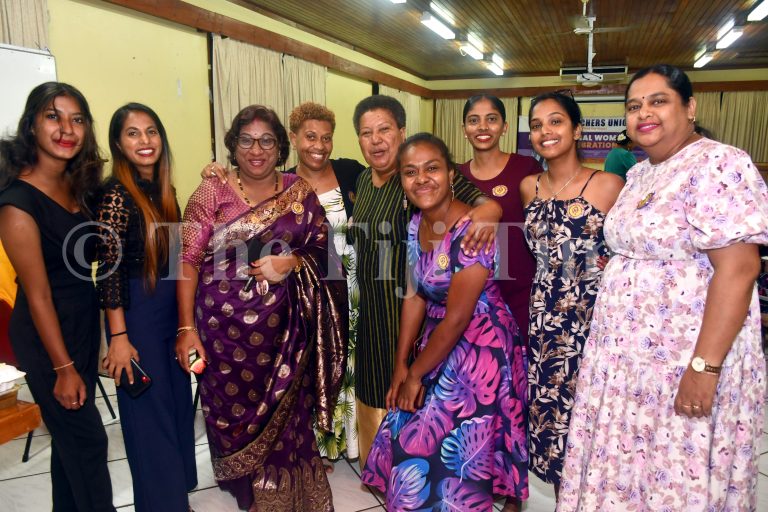HEALTH and the wellbeing of women fall hand in hand, and if the Women’s Economic Empowerment Plan 2023 to 2028 is to succeed, Fiji must first ensure women fully participate and become leaders in the community.
This was articulated by Minister for Women Lynda Tabuya in Parliament last week.
She said the Fiji Country Gender Assessment confirmed that Fijian women were predominantly employed in low paying jobs within the “precarious” informal sector.
Ms Tabuya said only 35.2 per cent of women were in formal employment, and this disparity was underscored by the labour force participation rate of 45.5 per cent of all women, compared with 82.6 per cent of men. This signified a gender gap of about 38 per cent.
The minister said these challenges extended beyond employment, as nearly two-thirds of Fijian women experienced intimate partner violence, with an associated economic cost to our nation of approximately $400million annually.
This amounted to about 7 per cent of Fiji’s GDP.
“In our academic institutions, despite women representing 65 per cent of students, as it is evidenced by our students who sit in the gallery today, over half of the graduates face disproportionately high unemployment,” she said.
“Particularly among young women aged 15 years to 24 years, where 30 per cent are neither in education, neither in employment nor in training. That is, three times the rate of young men.
“In the MSME sector, which contributes 18 per cent of Fiji’s GDP, about half the businesses are owned by women. Yet only 19 per cent of these enterprises are registered under women’s names, and they often operate in low productivity sectors.”
Ms Tabuya also said that Fijian girls and women spent two to three times more on unpaid domestic and care work compared with boys and men.
She also said a significant proportion of Fijian women lacked the autonomy to make their own healthcare decisions.
“Notably, cancers of the reproductive organs, such as cervical and breast cancer, are the leading diseases causing death amongst women of all ages in Fiji, with these cancers being among the top five causes of cancer deaths.”
In this regard, Ms Tabuya said, the upcoming Fiji Women’s Economic Empowerment National Action Plan (WEENAP) represented the Coalition Government’s commitment to unlock the economic potential of Fijian women and girls, ensuring their full participation and leadership in our economy.
Initial steps to roll out this program included a high level technical advisory workshop for about 50 leaders and experts from civil society organisations, government agencies, the private sector, informal sector, and women’s rights organisations.
Through this workshop, Ms Tabuya said, several issues affecting women were identified, including the over representation of women and girls in the informal economy, issues of bodily autonomy, limited access to sexual and reproductive health rights and daily impacts of the climate crisis.
It was also found that women and girls had limited knowledge access and productive use of digital technology and e-commerce, limited access to financial resources and the presence of gender-blind policies and discriminatory norms, Ms Tabuya said.
“A key point from the workshop was that women’s control over their bodies is crucial, not just for health, but also for economic empowerment.
“A healthy woman is a productive woman. Bodily autonomy lets women make important decisions that affect both their personal and work lives. It helps them fully participate in the workforce, start, or grow their businesses and reach their economic goals.
“Therefore, supporting and promoting women’s bodily autonomy is vital for them to succeed in all areas of their lives.”
Ms Tabuya said Cabinet had endorsed the implementation of WEENAP in February this year, and a team of experts was subsequently put together to drive this initiative forward.
“I am also pleased to announce that we have developed a robust consultation framework for the WEENAP. This consultation phase is set to commence in May, next month, and will run until the end of July.
“This consultation aims to alleviate awareness of the importance of women’s economic empowerment, spotlighting the significant contributions of women and addressing the challenges that hinder their full participation.”
She said about 104 stakeholders directly or indirectly contributed to the consultation of WEENAP.
Ms Tabuya said a final report was scheduled for release in August this year.
“Upon completion of this consultation, we will be drafting the Women’s Economic Empowerment Plan.
“This document is expected to undergo validation by the taskforce in September this year and, of course, will be submitted to Cabinet for approval, with the launch planned, hopefully, at the end of this year or early next year.”






